Homo habilis - Study guides, Class notes & Summaries
Looking for the best study guides, study notes and summaries about Homo habilis? On this page you'll find 112 study documents about Homo habilis.
Page 2 out of 112 results
Sort by
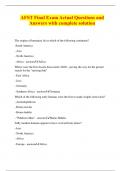
-
AFST Final Exam Actual Questions and Answers with complete solution
- Exam (elaborations) • 18 pages • 2024
- Available in package deal
-
- $12.49
- + learn more
AFST Final Exam Actual Questions and Answers with complete solution The origins of humanity lie in which of the following continents? -South America - Asia - North America - Africa - answerAfrica Where were the first fossils discovered (1856) - paving the way for the greater search for the "missing link" - East Africa - Java - Germany - Southern Africa - answerGermany Which of the following early humans were the first to make simple stone tools? - Australopithecus - Homo erectus...

-
AFST 235 Final Exam Actual Questions and Answers Graded A+
- Exam (elaborations) • 18 pages • 2024
-
- $12.49
- + learn more
AFST 235 Final Exam Actual Questions and Answers Graded A+ The origins of humanity lie in which of the following continents? -South America - Asia - North America - Africa - answerAfrica Where were the first fossils discovered (1856) - paving the way for the greater search for the "missing link" - East Africa - Java - Germany - Southern Africa - answerGermany Which of the following early humans were the first to make simple stone tools? - Australopithecus - Homo erectus - Homo ...
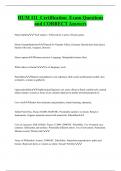
-
HUM 111 Certification Exam Questions and CORRECT Answers
- Exam (elaborations) • 13 pages • 2024
-
- $8.49
- + learn more
Homo habilis"Tool makers." Followed by a series of homo genus Homo NeandrathalensisNamed for Neander Valley, Germany. Buried their dead (dyed, buried with tools, weapons, flowers) Homo sapiensHuman ancestor. Language. Manipulated nature (fire) What makes us human?Use of language, tools PaleolithicHunters and gatherers, non sedentary, little social stratification/wealth, men as hunters, woman as gatherers

-
UTHS World History A
- Exam (elaborations) • 52 pages • 2024
-
- $11.99
- + learn more
UTHS World History A Select the most appropriate description of a nomadic tribe - group of people who traveled from location to location following herds of animals which provided food and clothing which of the following is a scientist that works to uncover artifacts physically unearthing these objects that the remains of people who created them - archaologist what period of history refers to the time when people did not leave written records - prehistory Mary Leakey's 1970s disco...
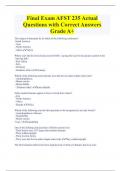
-
Final Exam AFST 235 Actual Questions with Correct Answers Grade A+
- Exam (elaborations) • 12 pages • 2024
- Available in package deal
-
- $10.49
- + learn more
Final Exam AFST 235 Actual Questions with Correct Answers Grade A+ The origins of humanity lie in which of the following continents? -South America - Asia - North America - Africa Africa Where were the first fossils discovered (1856) - paving the way for the greater search for the "missing link" - East Africa - Java - Germany - Southern Africa Germany Which of the following early humans were the first to make simple stone tools? - Australopithecus - Homo erectus - Hom...
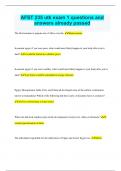
-
AFST 235 utk exam 1 questions and answers already passed
- Exam (elaborations) • 39 pages • 2024
- Available in package deal
-
- $10.99
- + learn more
AFST 235 utk exam 1 questions and answers already passed The first hominin to migrate out of Africa was the: Homo erectus In ancient egypt, if you were poor, what would most likely happen to your body after you've died? it would be buried in a shallow grave In ancient egypt, if you were wealthy, what would most likely happen to your body after you've died? Your body would be entombed in a large structure Egypt, Mesopotamia, India, Peru, and China all developed some of the earliest civilizat...

-
BIOCHEM 32A Exam 3 MC 50 Questions and Answers Updated 2024/2025 Solved 100%; University of Notre Dame
- Exam (elaborations) • 11 pages • 2024
-
- $15.49
- + learn more
BIOCHEM 32A Exam 3 MC 50 Questions and Answers Updated 2024/2025 Solved 100%; University of Notre Dame 1. Nearly all animals are eukaryotes that undergo a stage where they are sexually immature and morphologically distinct from the adult stage. a. Heterotrophic : Larval b. Multicellular : Juvenile c. Autotrophic : Larval d. Multicellular : Autotrophic 2. During development, animals undergo a stage where they are comprised of a hollow, multicellular sphere of cells. a. Gastrula ...

-
BIO 101 FINAL Exam Questions and Answers With 100% Correct Solutions 2024 Graded A+ | STRAIGHTERLINE
- Exam (elaborations) • 21 pages • 2024
-
- $18.49
- + learn more
BIO 101 FINAL Exam Questions and Answers With 100% Correct Solutions 2024 Graded A+ | STRAIGHTERLINE. the calvin cycle reactions are dependent upon a supply of carbon dioxide, NADPH, and ATP which cofactor is involved in the Calvin cycle reactions? NADP+ segments of DNA that are not part of the gene are called introns which of the following is not true of ribosomes they bind only one type of amino acid which part of an operon is incorrectly matched with its function? regulator--binds to the ...

-
History 100 Certification Exam Questions And CORRECT Answers
- Exam (elaborations) • 7 pages • 2024
- Available in package deal
-
- $7.99
- + learn more
Biological classification Animalia,Chordata, Mammalia, Primates, Hominid, Homo, and Sapiens australopithecus africanus mix of human & chimp-like features homo habilis tool use homo erectus upright, fire use, migration, care for young homo sapiens Humans
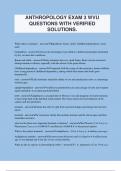
-
ANTHROPOLOGY EXAM 3 WVU QUESTIONS WITH VERIFIED SOLUTIONS.
- Exam (elaborations) • 9 pages • 2024
-
- $11.49
- + learn more
ANTHROPOLOGY EXAM 3 WVU QUESTIONS WITH VERIFIED SOLUTIONS. What makes us human? - answerBipedalism, brains, skulls, Childhood dependency, tools, teeth biopedalism - answerstresses the advantages it provided in a habitat increasingly dominated by dry, savanna-like conditions. Brains and skulls - answerEarly hominins had very small brains, Brain size has increased during hominin evolution, especially with the advent of the genus Homo. Childhood dependency - answerCompared with the young o...

How much did you already spend on Stuvia? Imagine there are plenty more of you out there paying for study notes, but this time YOU are the seller. Ka-ching! Discover all about earning on Stuvia


